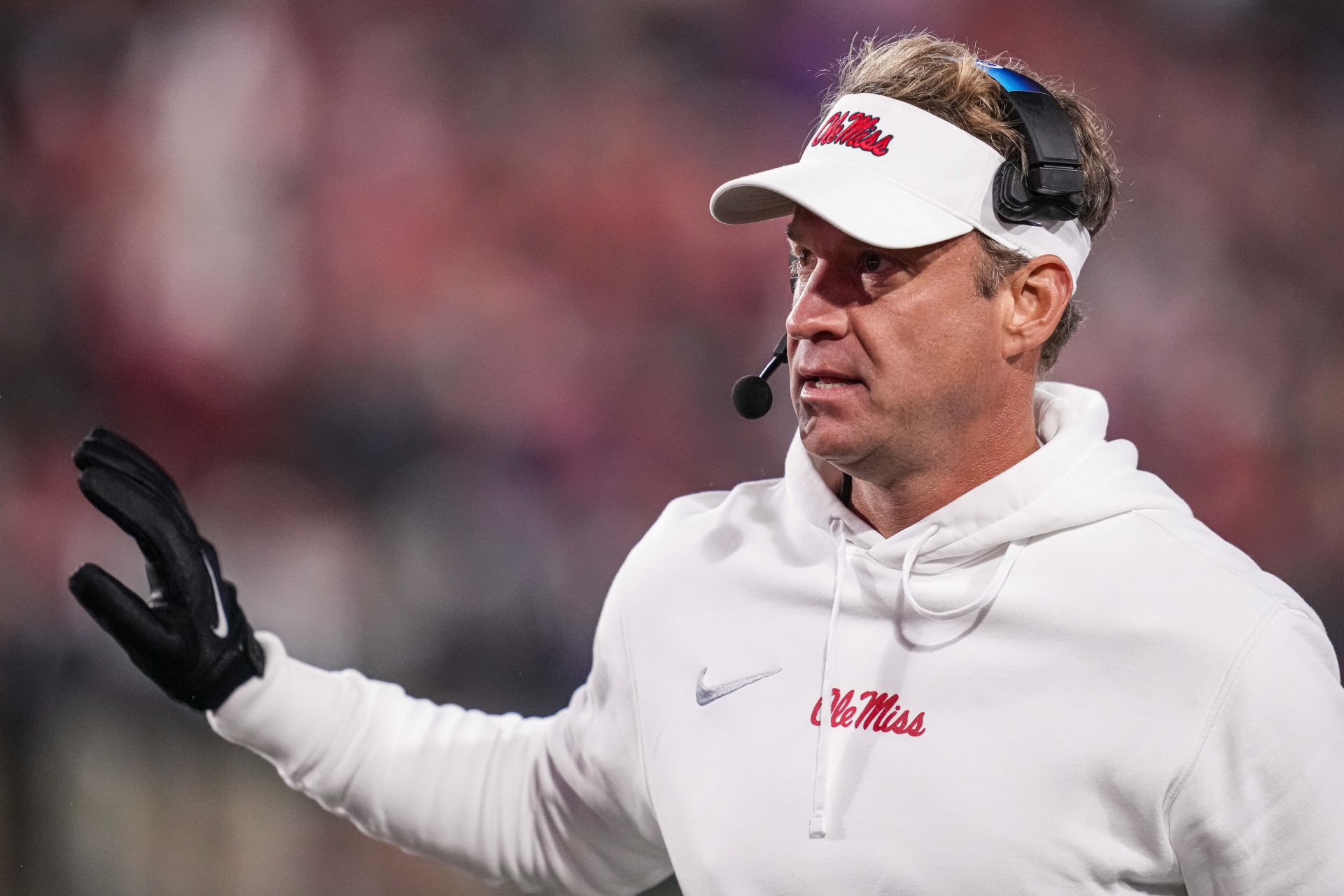Name, Image, and Likeness (NIL) has changed the landscape of college football and altered how head coaches go about recruiting. That includes Ole Miss Rebels head coach Lane Kiffin, who has benefited from changes in NIL legislation.
However, despite singing several key additions in 2024, the Rebels head coach has spoken about how NIL has been a disaster for college football.

Lane Kiffin Laments Current NIL Climate
Despite taking advantage of relatively new NIL legislation, Kiffin has been surprisingly incensed by how NIL has changed the college football landscape.
In an interview with On3, Kiffin openly criticized the changes that have allowed student-athletes to monetize their name, image, and likeness.
“It just probably sounds strange to a lot of people for me to say the disaster when we’re out there maximizing it as well as you can and as well as anybody,” Kiffin said.
“But to me, that tells you how much of a disaster it is. Even though it benefits us, I’m still telling you it’s a disaster even though it benefits us at Ole Miss a lot.”
The Ole Miss donors are some of the richest collectives in the sport and have played a critical part in attracting high-profile additions to Oxford from the transfer portal.
The clear lack of regulation has irked the Ole Miss head coach, who said they have had to learn “How to be outside the box. How to work with the rules — all the things.”
Kiffin also spoke openly about how the process of introducing NIL was divisive, saying, “You had this other side saying ‘This is ridiculous. The players shouldn’t be paid. This is going to go away.’ There was a lot of that.”
“A lot of coaches and administrators thought this was going to go away. From the beginning, I said it may, but it’s going to be a long time from now before it goes away. If you sit around and wait for it to go away, you’re going to be out of a job as an AD or a coach. And your football program is going to be really bad.”
How Has Kiffin Used NIL to His Benefit?
Ole Miss has done a great job of using the transfer portal to improve their program. However, a clear plan was established by Kiffin and Vice Chancellor for Intercollegiate Athletics, Keith Carter.
The plan in Oxford has been to emphasize transfer portal talent, knowing that, previously, if a player transfers into Ole Miss, they will have used their one-time transfer and would remain a Rebel for several years. If they pool all their resources into recruiting a high school product, they could choose to transfer out after just one season.
“When you take a younger player who has multiple years, until now, he couldn’t go again. So you have him for multiple years,” Kiffin said.
“When you take the high school kids, they still have their one-time transfer. It’s like looking at the A’s and Moneyball and all the analytics behind it.”
“So let’s take young players from another place when they use their one-time transfer versus the high school kid, that as soon as something doesn’t go right will just leave.”
However, in 2023, a court ruling specified that the one-time transfer ruling was invalid, therefore allowing student-athletes to transfer multiple times. Kiffin admitted that “we’ve got to adjust to that.”
If you’re not one of those top five blueblood programs, you’ve got to find a way to maximize all those areas,” Kiffin said.
MORE: Top 10 NIL Deals in 2024
The Ole Miss head coach also realizes that you can’t keep everybody on your roster. Despite bringing in high-profile signings — including Juice Wells and Princely Umanmielen in 2024 — the Rebels have lost star RB Quinshon Judkins, who will play for the Ohio State Buckeyes next season.
“You’ve got to let someone go,” Kiffin said, “because they’re saying they want this much money. But, you can get four other SEC starters for the money that one player is demanding.”
The money being thrown about is unprecedented, causing the transfer portal to turn into the Wild West. If, as Kiffin says, NIL is here to stay, then the Ole Miss HC believes it needs to be managed better.
Speaking about how he would make NIL more sufficient, the Rebels head coach said, “I would get some structure around it to make them employees so they have real contracts that everyone can see.”
“So you know what the market and people can’t say ‘I have this’ or ‘I’m making this.’ Then there would be revenue sharing involved, so it would be more equal to what they’re getting. And then there would be a cap.”
Kiffin isn’t the first head coach to speak out about the pitfalls of NIL and how it needs to be used to empower athletes. Before the National Championship Game, former Michigan HC Jim Harbaugh specified that revenue sharing is the optimal strategy.
Whatever the solution is, there is a growing consensus that the current lay of the land is unsustainable.
The complexities of today’s front-office work in college football have caused numerous head coaches to leave their positions to take up assistant roles with other college programs or the NFL. 2024 has seen a purging of talent from the head coaching cohort, setting an alarming precedent for the future.
KEEP READING: Ole Miss QB Jaxson Dart Inks NIL Mega Deal
In the current college football climate, NIL has become a free-for-all. Kiffin and several other prominent college head coaches are calling for a regulatory body, and they believe it needs to happen sooner rather than later.
Miss any action from the top college QB Rankings during the 2023 football season? Want to track all the movement with the college football transfer portal? College Football Network has you covered with that and more!

